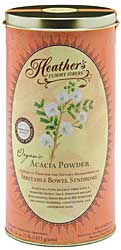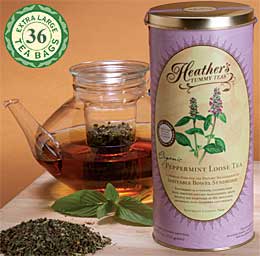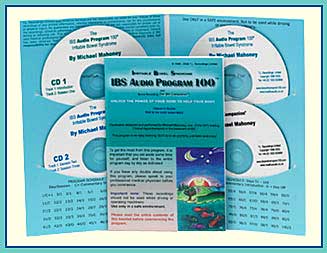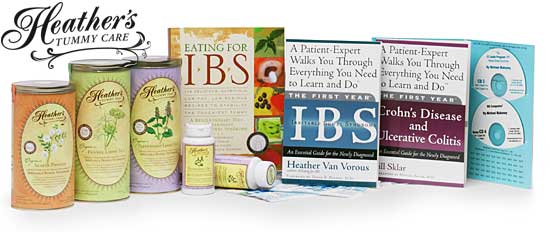| |
 |

Organic Acacia
Soluble Fiber
The prebiotic fiber that relieves both diarrhea and constipation!
In this Issue...
Food & Recipes
Special Letters
Rx News & Research
Ask Heather

Did you miss the latest
IBS newsletter, a special
Greatest Hits Issue?
Past issues
are posted here!
|
 |
|
| |
Heather's IBS Newsletter ~ For Irritable Bowel Syndrome
March 6, 2007
Answered prayers for Patricia and her IBS "miracle"
Hello to everyone -
This week we have a heartwarming letter from a woman who struggled with IBS for 12 years before finding some answers to her prayers. Her letter is so inspiring and sincere it made my day - I hope it makes yours!
We also have quite a provocative news and research article that just might ruin your day - let me know if you find the idea that "overly anxious and driven" people are more prone to IBS an affirmation of your own experiences, or simply insulting.
Finally, we revisit one of the sneaky sins of the IBS diet (vitamin supplements - friend or foe?) and we've got a simply delicious sweet potato salad - enjoy!
Best Wishes,
Heather Van Vorous
Did a friend send you this newsletter? Sign up here for your own free subscription. 
Simple Roasted Sweet Potato Salad This is a delicious twist on traditional potato salad, and it is incredibly easy to make. The sweetness of the potatoes plays off the tanginess of the cider vinegar, with delicious (and high soluble fiber, low fat) results.
Makes 4 Servings
1 1/2 pounds sweet potatoes (about 2 large), peeled, quartered lengthwise
1 tablespoon plus 1 teaspoon olive oil, divided
2 tablespoons green onions, finely diced
3 tablespoons apple cider vinegar
1/8 teaspoon salt
Preheat oven to 400 F. Place sweet potatoes in large baking dish, drizzle with 1 tablespoon oil, and toss potatoes until evenly coated. Cover pan with foil and bake 20 minutes. Uncover pan, turn potatoes and bake uncovered until tender and golden brown, about 15-20 minutes. Cool potatoes and chop into bite-size pieces. Transfer to serving bowl.
Whisk vinegar with remaining teaspoon of oil and salt. Pour over potatoes, add scallions, and stir gently until well-combined.
For a special treat, serve the potato salad as a side dish with Louisiana Barbecued Catfish Sandwiches.
Are you just learning how to eat for IBS? A little intimidated at the thought of special IBS recipes? Not quite sure just what makes these recipes special in the first place? Don't worry! Come see the IBS Diet pages, and find the answers to all your questions.
  
Organic Fennel & Peppermint Tummy Tea Bags
Extraordinary Quality ~ Very Economical
Fennel is terrific for bloating & gas, Peppermint is great for IBS pain & spasms.
 Answered Prayers for Patricia
Answered Prayers for Patricia
Dear Heather,
I just had to let you know that I am also one of your "miracles". I developed IBS approximately 12 years ago and during that time had a number of embarrassing episodes happen to me. Up until this past January when I simply broke down, cried and prayed that I would find an answer.
I prayed and asked St. Jude, the patron saint of the impossible, for help of some kind. Within a week of my prayer time, I was surfacing the web and "stumbled" on your website. I silently asked myself if this were the answer I was searching for as I scrolled down through numerous testimonials.
After reading many, I came across one from a lady who wrote that she also "prayed for help." THIS was my sign and I ordered the Acacia Tummy Fiber and Peppermint Oil Tummy Tamers and began taking them January 13 of this year (2007).
I no longer have the urgency of locating a ladies room every time I venture out of my home. Reading your book on what and HOW to eat was really a big factor in helping me.
I, like many, had also asked my gastroenterologist to guide me in what to do and a diet I could tolerate - he shrugged his shoulders and offered no help. I was totally on my own....until you came into my life.
You are a lifeline to many. I will definitely recommend your website to anyone who has this same problem and I will definitely take your website information to my doctor the next time I have an appointment with him.
Whether this gets published in your column is up to you, but I just had to write you my heartfelt thank you. THANK YOU!
Patricia N.
Mesquite, Texas
P.S. Thanks to St. Jude for prayers answered.
Thank you from the bottom of my heart, Patricia. I couldn't be more thrilled that you're feeling better! ~ Heather
Did you miss the recent reader letter from Yuri, and why he's no longer suffering through IBS?
~ Heather's Tummy Tamers ~For the Dietary Management of Abdominal Pain &, Bloating

Peppermint Oil Caps with Fennel and Ginger Are Amazing!
Our Peppermint Oil Caps have the added benefits of fennel and ginger oils, and they help prevent abdominal pain, gas, and bloating!
 Changes in Bowel Function in Pregnancy
Changes in Bowel Function in Pregnancy
A recent study in Digestive Diseases and Sciences noted that pregnancy is a time when women are susceptible to bowel habit perturbations. Prospective 7-day bowel habit diaries were completed during each of the three trimesters of pregnancy and after birth. Sensations of incomplete evacuation and time spent defecating were significantly increased during all three trimesters of pregnancy compared with after birth. Symptoms of urgency were higher in nonlactating mothers (41% of occasions) compared with lactating women (17% of occasions). This study has confirmed the importance of investigating a range of bowel habit parameters during and after pregnancy.
Go here for more information about this study...
New Insights into the Pathogenesis and Pathophysiology of IBS
An article in Digestive and Liver Disease noted that the pathogenesis and pathophysiology of irritable bowel syndrome is complex and still incompletely known. Potential pathogenetic factors include genes, infectious events, psychological symptoms and other loosely defined environmental factors. Both alterations at the central and peripheral level are thought to contribute to the symptoms of irritable bowel syndrome, including psychosocial factors, abnormal gastrointestinal motility and secretion, and visceral hypersensitivity. Today irritable bowel syndrome is viewed as a disorder of dysregulation of the brain–gut axis, involving abnormal function in the enteric, autonomic and/or central nervous systems, with peripheral abnormalities probably dominating in some patients and disturbed central processing of signals from the periphery in others.
Go here for more information about this study...
Paid Participants Sought for Online IBS University Research Study
The Annenberg School for Communication at the University of Southern California is conducting a research study looking at interpersonal communication patterns of people who have been diagnosed with Irritable Bowel Syndrome (IBS). The purpose of this study is to understand the possible link between IBS symptom severity and how one communicates with their closest relational partner. They are seeking volunteers to complete an approximately 15-minute online survey that includes questions about demographic and relational information, interpersonal communication patterns with a close relational partner, and severity of IBS symptoms.
To qualify for this study, you must meet the following criteria:
1. Be diagnosed by a physician with IBS at least three months ago 2. Consider IBS to be your primary health problem 3. Not be diagnosed by a physician with any other gastrointestinal disorder 4. Not currently be pregnant
The first 150 IBS-diagnosed participants will receive a $5 Amazon.com gift card via email once they have completed the online survey. Go here for more information about this study...
Overly Anxious and Driven People Prone to Irritable Bowel Syndrome
A recent article in Gut found that overly anxious and driven people are susceptible to irritable bowel syndrome. The researchers studied 620 people who had confirmed gastroenteritis caused by a bacterial infection. None had had IBS before, or any serious bowel disorder. They were then monitored three and six months later to see whether they had developed the typical symptoms of IBS, which include diarrhoea and/or constipation, abdominal pain and bloating. In all, 49 people had IBS at both time points. Women were more than twice as likely to have IBS as the men.
Those with IBS were significantly more likely to have reported high levels of stress and anxiety and psychosomatic symptoms than those who did not develop the condition. They were also significantly more likely to be "driven," carrying on regardless until they were forced to rest - a pattern of behaviour which only worsens and prolongs the condition, say the authors. Although not likely to be depressed, those with IBS were more likely to take a pessimistic view of illness.
"Gastroenteritis may trigger the symptoms, but cognitions, behaviour and emotions may help to prolong and maintain them over time," conclude the authors, who suggest that cognitive behavioural therapy may be an effective treatment.
Go here for more information about this study...
Looking for more IBS research and news? Check the IBS Research Library!
The Best Gut-Directed Self-Hypnosis Program for All IBS Symptoms
 
Gives an average 85% reduction of pain and bowel dysfunction symptoms.
Listen to IBS Audio Program 100 samples!
 Vitamins and IBS Vitamins and IBS
"I'd like to take a multi-vitamin and multi-mineral supplement just to be sure that I'm getting the nutrients I need. But every time I take my vitamin pills I feel worse, not better. What's going on?"
I get asked this question a lot - so much, in fact, that I've previously listed vitamin pills as one of the Seven Sneaky Sins of the IBS diet. I thought it was time to revisit this issue for folks who missed the sneaky sins the first time around.
In general, many vitamin and mineral supplements often cause GI problems for people with IBS. It's a good idea to ask your local pharmacist about the most tolerable brands of vitamins in their store. GI upsets are very common with vitamins, and pharmacists are familiar with this request. Prenatal vitamins may be an option, as they are sometimes formulated specifically to help minimize the risk of GI side effects. You may be able to simply phone in a prescription request for these from your doctor - just explain why you need them.
Liquid vitamins or powder caplets may also be more tolerable than pills. Another thing to consider is the fillers and additives in many vitamins; check the ingredients for lactose, artificial colors, and preservatives, as many people with IBS are sensitive to even small quantities of these substances. A health food store may have a wider variety of additive-free vitamins than a drug store. It's often helpful to take two or three smaller-dose vitamin/mineral supplements each day instead of one large dose. This will not only reduce the risk of GI upsets, but will aid your body in absorbing the nutrients as well. If you can't find smaller-dose vitamins, try just breaking a regular pill in half. Always take your vitamins with a meal, and never on an empty stomach.
Vitamin C is particularly notorious for causing gas, abdominal cramps, and diarrhea. Vitamin C is ascorbic acid, and as the name implies, it's acidic. When it enters the alkaline environment of the lower intestinal tract it can create diarrhea and gas. In Germany, vitamin C is actually an approved laxative, so imagine what it will do to you if you have IBS. The recommended dose for Vitamin C is generally under 2,000 mg. daily. Over that, and you really risk the GI side effects. Unless your doctor has recommended otherwise, make sure your multivitamin does not exceed one hundred percent of the US RDA for Vitamin C.
Calcium, magnesium, and iron all require special consideration as well. Calcium can have a constipating effect, which can be helpful or hurtful depending on your symptoms. Magnesium can have a laxative effect, and this too can either aid or exacerbate IBS, depending on the individual. For many folks with IBS, it's best to make sure that your mineral supplement is not giving you a megadose of either one of these ingredients, but simply a balance of the two. Calcium carbonate contains just calcium and no magnesium, and is a good choice if you always tend towards diarrhea. If you're IBS-C (prone to constipation), try calcium citrate instead, which contains magnesium. With either form of calcium, there should be Vitamin D included in the supplement as well for the best possible absorption. It's a good idea to take only 500 mg. of calcium per dose, as your body may not be able to absorb more than this all at once.
Iron can cause stomach upsets and be quite constipating, especially if it's ferrous sulfate (choose ferrous gluconate instead). Iron also blocks the absorption of calcium. If you aren't anemic or prone to anemia, you may well not need an iron supplement at all. If you do need to take an iron supplement and you're also taking calcium, have these supplements with different meals. Iron is best absorbed in the presence of Vitamin C. If you're trying to juggle all of these different supplements, it can be helpful to take your multivitamin with C and iron at one meal, and your calcium or calcium/magnesium combination with Vitamin D at another meal.
If you're also taking a soluble fiber supplement like Acacia Tummy Fiber, don't worry about timing your supplement around your vitamins/minerals. Soluble fiber will not interfere with the absorption of vitamins/minerals any more than food would. You can also take herbal supplements such as peppermint or fennel at the same time you have your vitamins/minerals.
As a rule, it's always best to get your nutrition from as wide a variety of fresh fruits, vegetables, legumes, grains, and nuts as possible. There are many nutrients in whole foods that simply can't be extracted into pills. If you're struggling to add enough nutrition to your diet, check the IBS guidelines for incorporating insoluble fiber foods into your meals, and take a look at IBS safe recipes that offer good examples of how to do this. Until you're able to stabilize your IBS, you may not want to add in any vitamin/mineral supplement at all (unless medically necessary); this will eliminate the risk of the potential GI upsets from the supplements.
~ Heather
Did you miss the last "Ask Heather" and how to find Tummy Care products in local stores? Find it here...

Shop at Heather's Tummy Store for IBS
HelpForIBS.com
The only store that's just for IBS - so we only carry the very best

You're on this newsletter list because you have expressed interest in IBS news and information.
Change your newsletter email address here.
If you are viewing this newsletter on a website and would like to subscribe for email delivery, please "Join the IBS Newsletter" here.
ANTI-SPAM PRIVACY & SECURITY POLICY
HelpForIBS.com
Heather's Tummy Care
80 S. Washington St, #304
Seattle, WA 98104 USA
© 2007 Heather Van Vorous, Heather's Tummy Care. All rights reserved.
USA Copyright Office Registration Number TXU 1-270-858 and others
|
|
| |